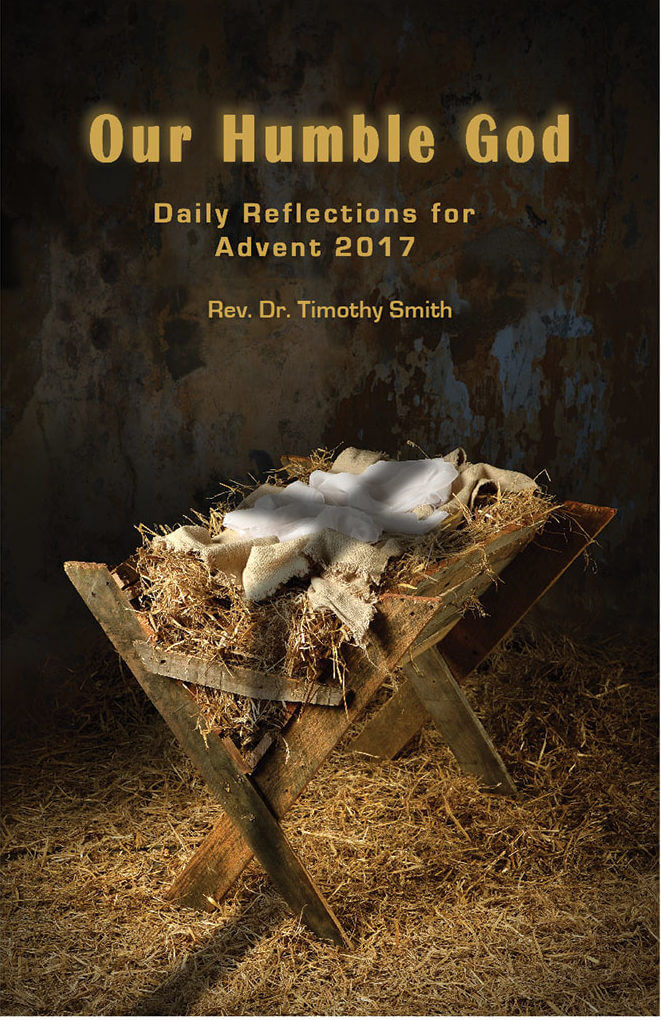PRAY:
Settle yourself into prayer and get ready to reflect on the Word of
God.
READ:
And being found in human form, he humbled himself and became obedient
to the point of death—even death on a cross. Therefore God also highly
exalted him and gave him the name that is above every name, so that at
the name of Jesus every knee should bend, in heaven and on earth and
under the earth, and every tongue should confess that
Jesus Christ is Lord, to the glory of God the Father.
Philippians 2:7b-11
Humility is a mysterious and paradoxical quality. The moment I think I have it I probably don’t. In addition, humility is often mistaken for weakness, for a lack of spirit and for making oneself a doormat. Notice the emphasis in today’s world that is placed on self-fulfillment, self-expression, selfesteem, “selfies” and how I’m looking on Facebook. Our culture, not unlike the ancient Roman culture, does not accord a high place to humility. Dallas Willard jokingly imagined a bumper sticker that you will never see: “’My child learned humility at school today,’ rather than ‘My child is an honor student at Success Academy.’” (“Spiritual Disciplines in a Postmodern World”, Radix magazine, Vol. 27) An upside-down world always mistakes humility for weakness rather than a manifestation of inner strength. The Christ Hymn would lead us to think John Ruskin’s observation right, “I believe that the first test of a great man is his humility.” (The Stones of Venice)
But any reader of the Christ Hymn might be taken aback to see that the eternal and sovereign Son of God humbled Himself, becoming obedient so that He might serve. Yet Reformed theologian Karl Barth saw in the Son of God’s humility the revelation of God’s greatness:
The truth of the one God – as opposed to all the divinities invented by men – is seen in Jesus Christ in the fact that He is free not only to be exalted but also to be lowly… The God who is great enough to be obedient and humble and small, and therefore truly great, wills to be and is this. This is what He does in Christ Jesus. And does it for our sake, for us, to take us to Himself. The Freedom that limits itself to create freedom is true omnipotence, as the love that can humble itself to save is truly almighty.” (Church Dogmatics, IV/1 )
Jesus demonstrated the strength of humility in those dark hours before He laid down His life on the cross. The Gospel of John vividly recounts the scene in the Upper Room as Jesus gathered His disciples for His last meal:
And during supper Jesus, knowing that the Father had given all things into his hands, and that he had come from God and was going to God, got up from the table, took off his outer robe, and tied a towel around himself. Then he poured water into a basin and began to wash the disciples’ feet and to wipe them with the towel that was tied around him” (John 13:2b-5).
Note in this poignant moment that Jesus is totally secure in knowing who He is: “knowing that the Father had given all things into his hands, and that he had come from God and was going to God…”. Thus, Jesus is enabled to get up from the table in His last hours to serve others. Eastern Orthodox theologian Kallistos Ware looks at Jesus’ humility and remarks: “Such exactly is the supreme paradox of Christianity: God is never…. so truly divine as when He empties Himself.” (The Inner Kingdom)
Remarkably, after humbly washing His disciples’ feet, the Son of God commands us to do as He has done: “So if I, your Lord and Teacher, have washed your feet, you also ought to wash one another’s feet” (John 13:14). Jesus means for us to be secure in who we are in Him, loved by the Father and one day going to the Father. We are thus empowered as God’s own beloved children to reach out in His humble love to others. This is the why of Christmas, the reason the Son of God came down to us: that we might share in His very life and love! He is our humble God!
REFLECT:
- Think of a time when you saw a person demonstrate strength by being humble.
- Why do you think a person first needs to have inner security and strength before he can act humbly toward others?
- Secured by the Father’s boundless love for you, how might God be empowering you for the purpose of reaching out to someone with humble, forgiving love?
“In no other religion do we have a god who stoops, a god who
comes down into human history in the most inconceivably personal
way. But here in Christianity, we have a God who wants to be
united with us and who is prepared to humble Himself and
even to suffer to accomplish such a union.”
C. Baxter Kruger, Jesus and the Undoing of Adam


